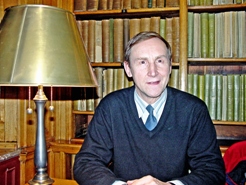
Leader, Geoscientist 17.1, January 2007
Science Secretary Prof. Tony Watts wishes to lead you in a rousing chorus…
This edition of Geoscientist comes to you at the beginning of a year in which we celebrate our Society's bicentennial. It will be a year when we look back at its many achievements, and ponder its future.
The Society has had a long and distinguished history in promoting Earth science. Through its publications, meetings and field trips it has played a central role in developing our ideas on how mountains are built, continents rift, and basins subside. I think Murchison and Lyell would have been impressed! But, as the strapline that has served the Society for the past 10 years (Serving Science and Profession) suggests, the Society is not just about pure science. It has been actively involved in promoting the applied side of the subject. Indeed, the merging of pure and applied is something that the Society has done very successfully - ever since learning its lesson over William Smith, his famous 1815 map, and his pioneering work as a stratigrapher and civil engineer on the canals of north Somerset.
Today, the Society is facing possibly its greatest challenge yet, as Earth Science finds itself at the forefront of current debates about climate change, sea-level change, and geohazards. The Science Committee, which is made up of the Society’s specialist and regional groups, has been actively involved in the Bicentennial activities. My predecessor, Bruce Yardley, has played a major role in helping to organise the Bicentennial Conference (10-12 September, at the Queen Elizabeth II Conference Centre in London). This exciting conference will comprise two days of science talks and posters on ‘hot topics’ in the environment, the Earth and planetary interiors, and the Earth system. And on Day three speakers from academia, industry, and government will present new results and ideas relevant to our understanding of the planet as a whole and how these affect key issues such as water and energy resources.
Other activities that we have been working on are a public lecture series and regional university lecture series. The idea of the former, titled the Shell London Lecture Series, is to bring modern Earth science and its relevance before the general public. The intended audience are those with an interest in science, but who are perhaps unfamiliar with Earth science. The speakers are all active scientists working on topics of current interest to society, such as volcanoes, earthquakes, oil and gas, and climate change. Launching the lectures at the end of this month will be our President (see p. ??) who will speak on The History of Life. The university lecture series (still being planned) will take the message outside of London, to a selection of university towns.
The Bicentennial is, of course, only a milestone (albeit a very significant one!) and so it is important that we look beyond it. The Science Committee has therefore been starting to think about its role and how it can best serve the Society in future. We welcome the addition of the new Forensic Geoscience specialist group, but wonder if there are other groups that need to be formed - or existing ones that need to revived! We have also been considering future meetings and whether we should take a more active role in proposing discussion topics. Two that have come up recently, for example, are palaeobotany and Holocene sea-level change. We welcome your views on these and other topics as we prepare for the momentous year ahead.